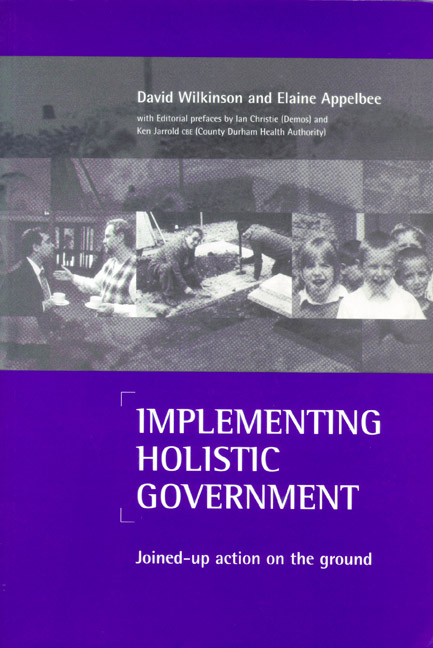Book contents
- Frontmatter
- Contents
- Editorial preface
- Editorial preface
- Acknowledgements
- Summary
- 1 Setting the context
- 2 The functional inheritance and its consequences
- 3 The public service, community interface
- 4 Change that works – sustaining community and quality of life improvement
- 5 Change that works – sustaining organisational and whole system change
- 6 Developing the middle ground: where bottom-up meets top-down (a third way for local governance?)
- 7 Improving sustainable quality of life: the benchmark for Best Value
- 8 Joined-up action on the ground: six key issues that have to be addressed
- 9 Working in the middle ground: recommendations to promote joined-up action on the ground
- References
9 - Working in the middle ground: recommendations to promote joined-up action on the ground
Published online by Cambridge University Press: 05 July 2022
- Frontmatter
- Contents
- Editorial preface
- Editorial preface
- Acknowledgements
- Summary
- 1 Setting the context
- 2 The functional inheritance and its consequences
- 3 The public service, community interface
- 4 Change that works – sustaining community and quality of life improvement
- 5 Change that works – sustaining organisational and whole system change
- 6 Developing the middle ground: where bottom-up meets top-down (a third way for local governance?)
- 7 Improving sustainable quality of life: the benchmark for Best Value
- 8 Joined-up action on the ground: six key issues that have to be addressed
- 9 Working in the middle ground: recommendations to promote joined-up action on the ground
- References
Summary
“Partnerships, empowering communities, sustainability … we are doing that already.” (Any one of thousands of public service chief executives, directors and service managers [and some politicians])
“Partnerships, empowering communities, sustainability … we’ve been elected at the ballot box so we are entitled to tell people what they need. That's why they elected us.” (Many of the other local politicians)
Faced with the choice between changing one's mind and proving there is no need to do so, almost everybody gets busy with the proof. (J.K. Galbraith, quoted by Bright, 1997, p 110)
When it comes to contemplating radical change, especially that which requires the embracing of other professional worlds and life in neighbourhoods and communities, much of local government in particular has been a hot bed of complacency. The institutions of local government have been continuously critical of centrally-determined policy for reform directed at it, but have not been able to formulate their own proposals and innovations that address the essential need to reform.
Further, the level of resources devoted to research and development is pitiful. While some other areas of public service may have been a little more innovative, the overall history has been depressing.
Currently, public service agencies are giving considerable attention to the more structural and legalistic aspects of the reform agenda. While this is necessary, it is also entirely predictable that they will do this largely to the exclusion of these aspects that relate more closely to the issues being addressed here. This is simply to follow the Fordist and Taylorist traditions and their preoccupation with the structural aspects of power and control.
Most attention in local government is likely to focus upon deriving new structures and mechanisms of governance and partnership as ends in themselves. Similarly, the reorganisational aspects around the formation of primary care groups – not to mention the political obsession with waiting lists – may well take attention away from the primary purposes of the reforms. For the police service, the immediate legal, structural and partnership aspects of the Crime and Disorder Bill are likely to become paramount. The real concern is that many of our public services will not progress beyond these short-term concerns. What should be the means towards longer-term ends become ends in themselves. Each agency may pursue partnership, consultation and involvement, driven from its own agenda and needs, and the necessity ‘to comply’ with the formal aspects of government requirements.
- Type
- Chapter
- Information
- Implementing Holistic GovernmentJoined-Up Action on the Ground, pp. 151 - 162Publisher: Bristol University PressPrint publication year: 1999



